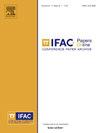基于鲁棒输出预测控制的串联式混合动力汽车能量管理效率与性能改进
Q3 Engineering
引用次数: 0
摘要
近年来,随着碳中和努力的加快,混合动力汽车作为一种临时解决方案引起了人们的关注。混合动力汽车可以通过能源管理策略(EMS)将发动机和电机的功率优化分配,从而提高燃油经济性。提出了一种对不确定性具有鲁棒性、计算量小的EMS预测控制方法,并在HEV分体式模型中验证了鲁棒预测控制的有效性。然而,该模型没有考虑到发动机启动时的额外燃料消耗,因此无法准确评估燃料消耗。在本报告中,为了提供更准确的油耗评估,并验证所提出的方法对串联型混合动力汽车也是有效的,采用了GT-Power的串联型混合动力汽车的详细模型进行了数值模拟。此外,提出了一种以SOC为核心的新方法,减少了发动机的on /OFF开关,旨在进一步提高效率和实用性。本文章由计算机程序翻译,如有差异,请以英文原文为准。
Efficiency and Performance Improvement of Energy Management for Series-type HEVs by Robust Output Predictive Control⁎
In recent years, as efforts towards carbon neutrality have accelerated, HEVs have attracted attention as an interim solution. HEVs can improve fuel economy by optimally splitting the power of the engine and motor through an energy management strategy (EMS). Robust predictive control, a predictive control method that is robust to uncertainty and small computational load, was proposed for EMS and its effectiveness was verified in a split HEV model. However, the model did not take into account the extra fuel consumption at engine start-up, thus not allowing an accurate evaluation of fuel consumption. In this report, a detailed model of a series-type HEV with GT-Power is used for numerical simulation to provide a more accurate fuel consumption evaluation and to verify that the proposed method is also effective for series-type HEVs. Furthermore, a new method focusing on SOC is proposed, which reduces engine ON/OFF switching and aims to further improve efficiency and practicality.
求助全文
通过发布文献求助,成功后即可免费获取论文全文。
去求助
来源期刊

IFAC-PapersOnLine
Engineering-Control and Systems Engineering
CiteScore
1.70
自引率
0.00%
发文量
1122
期刊介绍:
All papers from IFAC meetings are published, in partnership with Elsevier, the IFAC Publisher, in theIFAC-PapersOnLine proceedings series hosted at the ScienceDirect web service. This series includes papers previously published in the IFAC website.The main features of the IFAC-PapersOnLine series are: -Online archive including papers from IFAC Symposia, Congresses, Conferences, and most Workshops. -All papers accepted at the meeting are published in PDF format - searchable and citable. -All papers published on the web site can be cited using the IFAC PapersOnLine ISSN and the individual paper DOI (Digital Object Identifier). The site is Open Access in nature - no charge is made to individuals for reading or downloading. Copyright of all papers belongs to IFAC and must be referenced if derivative journal papers are produced from the conference papers. All papers published in IFAC-PapersOnLine have undergone a peer review selection process according to the IFAC rules.
 求助内容:
求助内容: 应助结果提醒方式:
应助结果提醒方式:


